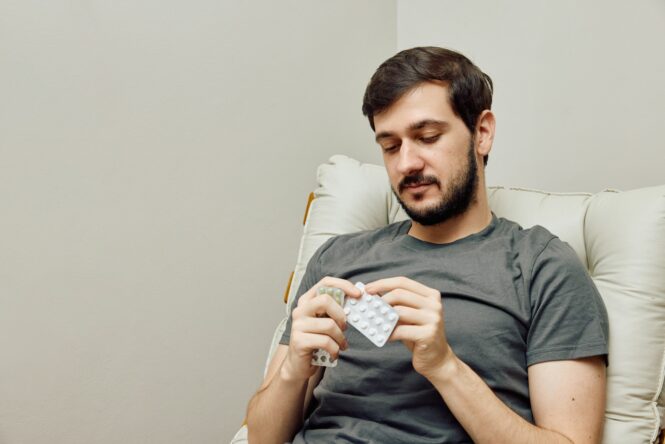Coming off medication—whether for anxiety, depression, ADHD, or anything else—is a deeply personal decision.

And while it can be the right move for some, it’s not something to do on a whim or without the right support. Tapering, timing, and emotional preparation all matter more than people think. If you’re thinking about reducing or stopping your medication, here are some important things to keep in mind along the way.
1. Make this a decision, not a reaction.

If you’re stopping medication because you’re feeling better, that’s valid. But it still needs to be a well-considered decision, not an impulsive move after a rough day or a period of frustration. Mood changes and burnout can cloud judgement. Before anything else, ask yourself why you want to come off it. Make sure it’s a choice rooted in reflection, not pressure or exhaustion. The “why” matters more than you think.
2. Talk to a professional, even if you feel sure.

Yes, it’s your body. But medication affects brain chemistry, and tapering needs to be managed properly. A doctor or psychiatrist can help plan a safe, gradual reduction that minimises withdrawal symptoms and emotional fallout. Even if you feel stable, they’ll help you anticipate what could change and support you through it. You don’t need permission, but by talking with your doctor, you’ll be protecting your well-being while making a major change.
3. Know that withdrawal doesn’t mean it’s the wrong choice.

Some people mistake withdrawal symptoms for relapse, when really, the brain is just recalibrating. You might feel off for a bit—tired, emotional, foggy—but that doesn’t mean you made a mistake. This is why tapering slowly matters. Coming off gradually gives your system time to adjust and makes it easier to separate what’s physical from what’s emotional.
4. Don’t romanticise being “medication-free.”

It’s okay to want to see how you feel without meds. But if you’re doing it because you think being off them makes you stronger, more authentic, or more “normal,” pause and check that mindset. There’s no medal for white-knuckling through your mental health. Needing support doesn’t make you weaker. The real goal isn’t to prove anything. It’s to feel well and stay well, whatever that looks like for you.
5. Expect your emotions to change, for better or worse.

Medication often buffers or softens emotional highs and lows. So, when you start tapering, feelings may hit harder. You might cry more easily or feel waves of emotion that seem intense compared to what you’re used to. This isn’t a bad thing, by any means, but it can be surprising. Be gentle with yourself and remind the people around you that you might need extra space or support while things level out.
6. Plan your timing carefully.

Try not to come off meds in the middle of a chaotic life phase. Moving house, switching jobs, or dealing with family stress? Not the best time to remove a stabiliser from your system. Pick a period where you’ve got some breathing room. Make sure your schedule, environment, and support network can hold space for any temporary instability.
7. Track how you’re doing—not just mentally, but physically.

Some side effects of withdrawal are physical—dizziness, nausea, fatigue. Others are cognitive—brain fog, irritability, weird dreams. Write things down or use a mood tracker to get a clearer picture of what’s happening week to week. This helps you spot patterns and know whether you’re adjusting or genuinely struggling. It also gives your healthcare provider a clearer sense of how your body’s responding to the changes.
8. Let people close to you know what’s happening.

You don’t have to announce it to everyone, but letting one or two trusted people know you’re tapering off can be grounding. They can keep an eye out for mood changes, remind you to slow down, or just check in more often. It’s easy to lose perspective when you’re in the middle of it. A second pair of eyes (or ears!) can be incredibly helpful when your emotions are changing and everything feels a bit unclear.
9. Have a plan for what to do if things wobble.

No shame if you try and realise you’re not quite ready. Coming off medication isn’t a one-shot decision. You can always press pause, adjust the tapering pace, or even go back on if you need to. Having a plan in place makes it feel less like a high-stakes gamble. It gives you permission to respond to your needs as they change, instead of pushing through out of pride.
10. Don’t assume you’ll feel the same off medication.

Some people come off meds and feel energised, clear, and like themselves again. Others feel raw, anxious, or slightly adrift. Neither reaction means something’s wrong—it just means your brain is adjusting to a new normal. Try not to hold onto expectations. Go into it with curiosity instead of pressure. This is a process, not a test. There’s no “correct” way to feel.
11. Explore other support tools as you transition.

Whether it’s therapy, mindfulness, exercise, supplements, or lifestyle changes—having additional tools in place can help support your system while it readjusts. You don’t need to replace medication with an intense self-improvement regimen. Just find a few things that make you feel anchored and steady during the transition. They don’t have to be big—just consistent.
12. Remember that trying is not failing.

If you come off meds and find that you don’t feel like yourself—or your symptoms return—it doesn’t mean you failed. It means you gathered data, listened to your body, and made a wise, informed decision to support your health. There’s no shame in returning to something that works. The real strength lies in paying attention, asking for help, and choosing what’s best for you without ego in the way. That’s what long-term wellbeing actually looks like.




